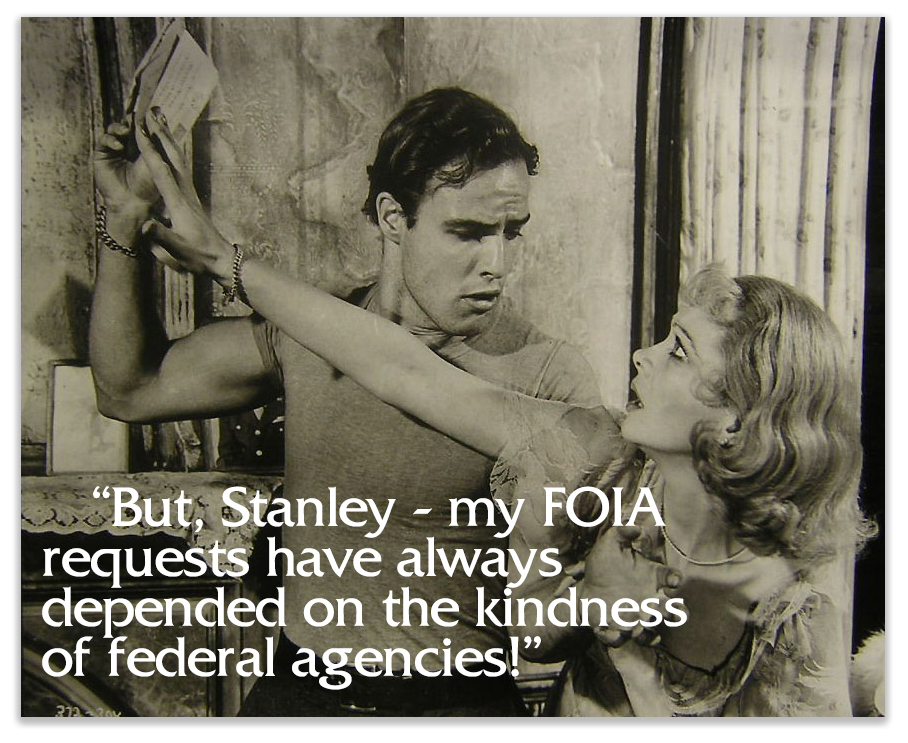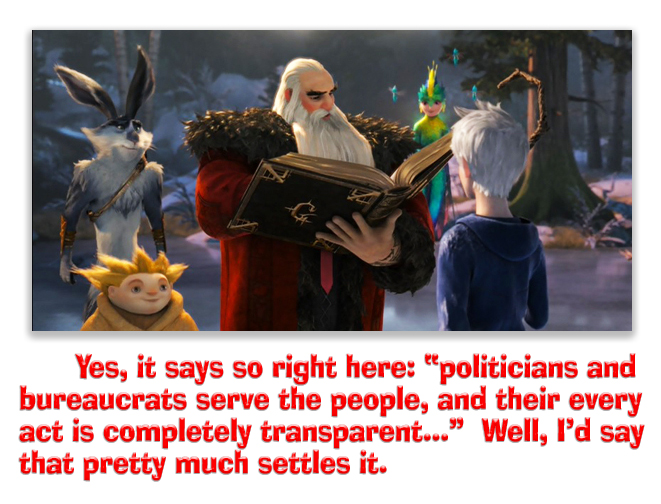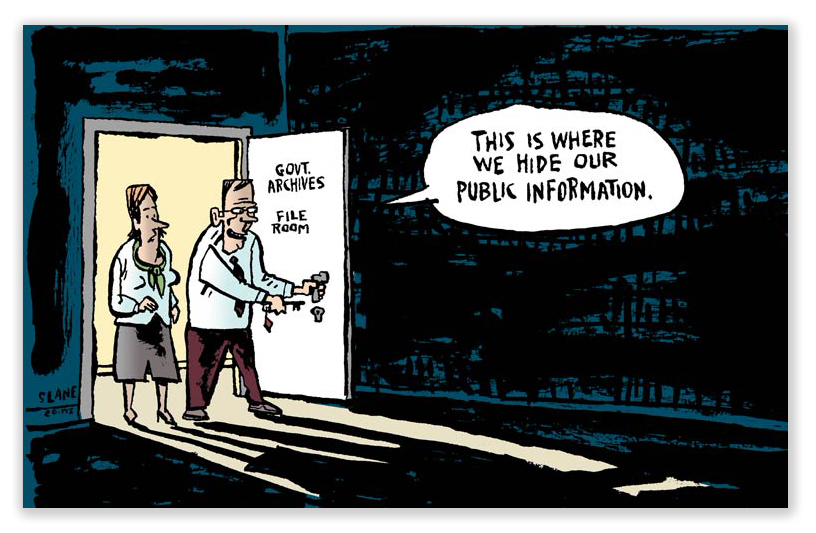We post news and comment on federal criminal justice issues, focused primarily on trial and post-conviction matters, legislative initiatives, and sentencing issues.
BAIT-AND-SWITCH
For those contesting constitutional infirmities in their convictions, nothing succeeds like facts. Prisoners representing themselves can recite precedent, circuit court bloviations and legal mumbo-jumbo ad nauseum, but none of it advances their cause unless they have facts – beautiful, concrete, sharp-edged, pulsating facts – to support their claims.
Blanche Dubois always depended on the kindness of strangers, but pro se litigants that such dependence is not a strategy (at least not a winning one). Usually, the only tool in a prisoner’s investigative toolbox is the Freedom of Information Act.
 There may be no federal statute that suffers a wider chasm between principle and operation. The government loves to call FOIA “the law that keeps citizens in the know about their government.” There is a “presumption of openness” underlying FOIA: agencies The FOIA provides that when processing requests, agencies proclaim that their guiding light is to “withhold information only if they reasonably foresee that disclosure would harm an interest protected by an exemption, or if disclosure is prohibited by law.”
There may be no federal statute that suffers a wider chasm between principle and operation. The government loves to call FOIA “the law that keeps citizens in the know about their government.” There is a “presumption of openness” underlying FOIA: agencies The FOIA provides that when processing requests, agencies proclaim that their guiding light is to “withhold information only if they reasonably foresee that disclosure would harm an interest protected by an exemption, or if disclosure is prohibited by law.”
We don’t need to recite our prior disillusion and disgust with agency management of FOIA requests. You can read here about how “the most transparent Administration in history” sandbagged FOIA for the last 8 years (and if you think the current Administration will do better, join the other three such believers over there in the corner – Santa Claus, the Easter Bunny and the Tooth Fairy).
 It’s ironic that last week’s FOIA decision from the D.C. Circuit concerned records that related in part to former House Speaker Tom DeLay, because “delay” was the primary defense played by the Department of Justice.
It’s ironic that last week’s FOIA decision from the D.C. Circuit concerned records that related in part to former House Speaker Tom DeLay, because “delay” was the primary defense played by the Department of Justice.
Thirteen years ago, the FBI opened a public corruption investigation into the activities of then-lobbyist Jack Abramoff. Ultimately, 21 people pled guilty or were convicted of offenses related to an influence-peddling racket. Two of those convicted had been senior aides to former House Majority Leader Tom DeLay. The FBI never indicated whether DeLay himself was a subject of the investigation, but in August 2010, DeLay himself announced DOJ had informed him he would not be charged.
A D.C. advocacy outfit named Citizens for Responsibility and Ethics in Washington – which is a nonpartisan do-gooder group or a left-wing attack dog in mufti (choose whatever floats your political boat) – filed an FOIA request in 2010 to get records about DeLay’s involvement in the investigation. DOJ managed to stretch the request into a lawsuit – including as 2014 trip to the Court of Appeals – without ever providing much of substance.
Initially, DOJ refused to provide any requested documents because they “involved third parties, they were generally exempt from disclosure and could not be released absent express authorization from each third party, proof of the third party’s death or a clear demonstration that the public interest in disclosure outweighs the personal privacy interest and that significant public benefit would result from the disclosure of the requested records. CREW sued, and DOJ argued that all responsive documents were categorically exempt under FOIA Exemptions 3, 6, 7(A), 7(C), 7(D) and 7(E).
The District Court agreed. But on appeal, the D.C. Circuit reversed, holding that DOJ had “not met its burden to justify categorical withholding under Exemption 7(A) or 7(C)” and had not “provided sufficient detail at this stage for a court to determine whether a portion of the requested records may be withheld under Exemption 3, 7(D) or 7(E).”

DOJ’s job on remand was to “make a more particularized showing as to what documents or portions thereof are exempt.” The FBI found of 328 pages of responsive material, 124 pages of which were released to CREW, although with redactions. The FBI withheld in full the remaining 204 pages. To justify its redactions and withholding, the FBI invoked FOIA Exemptions 3, 5, 6, 7(C), 7(D) and 7(E). Again, the District Court said, “good enough,” and threw out the CREW suit.
CREW appealed, arguing that the agency could not trot out a new Exemption 5 argument it had not used before, and that it cannot simply redact all the names in the documents other than DeLay and Abramoff on the basis of privacy.
The D.C. Circuit agreed. First, the Court said, in FOIA cases the government generally “must assert all exemptions at the same time, in the original district court proceedings.” There are only two exceptions, first when “pure human error” resulted in not raising the correct exemption earlier, and second “where a substantial change in the factual context of the case or an interim development in the applicable law forces the government to invoke an exemption after the original district court proceedings have concluded.”
 DOJ did not claim either exception applied, but instead just said that because it raised Exemption 5 – which covers “inter-agency or intra-agency memoranda or letters that would not be available by law to a party other than an agency in litigation with the agency” – in connection with another document, it was not engaged in “gamesmanship.” The Court said that did not matter: “The timeliness rule is concerned not just with efficiency in a given case, but also with efficiency in the long run, and it disserves this broader goal to permit untimely defenses, even after they have been argued, to prevail… [The] timeliness rule does not require a finding of bad faith or intentional gamesmanship.”
DOJ did not claim either exception applied, but instead just said that because it raised Exemption 5 – which covers “inter-agency or intra-agency memoranda or letters that would not be available by law to a party other than an agency in litigation with the agency” – in connection with another document, it was not engaged in “gamesmanship.” The Court said that did not matter: “The timeliness rule is concerned not just with efficiency in a given case, but also with efficiency in the long run, and it disserves this broader goal to permit untimely defenses, even after they have been argued, to prevail… [The] timeliness rule does not require a finding of bad faith or intentional gamesmanship.”
FOIA Exemption 6 encompasses “personnel and medical files and similar files the disclosure of which would constitute a clearly unwarranted invasion of personal privacy.” Exemption 7(C) protects “records or information compiled for law enforcement purposes, but only to the extent that the production of such law enforcement records or information… could reasonably be expected to constitute an unwarranted invasion of personal privacy.”
DOJ argued that revealing the names of others, some of whom were not indicted and some of whom were just witnesses and interviewees, would constitute an unwarranted invasion of privacy. CREW argued that some of the names of witnesses and subjects had already been made public in press releases and court documents, and that their privacy interests were lessened.
 This kerfluffle illustrates the problem with FOIA litigation. It is hard for a requester to argue that information it has been denied should not be exempt, because without knowing what the information is, how can one argue whether it does or does not fit an exemption? The agencies love to make blanket arguments – all redacted names should be private, for example – and they often win cases on summary judgment with such claims.
This kerfluffle illustrates the problem with FOIA litigation. It is hard for a requester to argue that information it has been denied should not be exempt, because without knowing what the information is, how can one argue whether it does or does not fit an exemption? The agencies love to make blanket arguments – all redacted names should be private, for example – and they often win cases on summary judgment with such claims.
Not today. The Circuit ruled that there are just too many moving parts to an Exemption 7(C) argument for summary judgment:
Because the myriad of considerations involved in the Exemption 7(C) balance defy rigid compartmentalization, per se rules of nondisclosure based upon the type of document requested, the type of individual involved, or the type of activity inquired into, are generally disfavored. The privacy interests of individuals who have not been convicted in connection with this investigation – and even more so those who have not been publicly linked with the investigation whatsoever – differ greatly from those of individuals who were convicted or pled guilty for their roles. Connecting the names of individuals to information contained in the documents at issue could add much, or not at all, to the public’s understanding of how the Government carried out its investigation and decision not to prosecute DeLay. There is little we can conclude in the abstract. This area is simply not well suited to categorical determinations.
CREW thus lives to fight another day. On remand to the District Court, DOJ must show the withholding of information under Exemptions 6 and 7(C) are based on “a particularized weighing of the public and privacy interests that would be implicated by the disclosure sought by CREW… The Government must account for the privacy interests at stake, recognizing that previous disclosures or admissions may have diminished those interests.
Citizens For Responsibility And Ethics In Washington v. United States Department of Justice, Case No. 16-5138 (D.C. Cir., Apr. 21, 2017)
– Thomas L. Root

